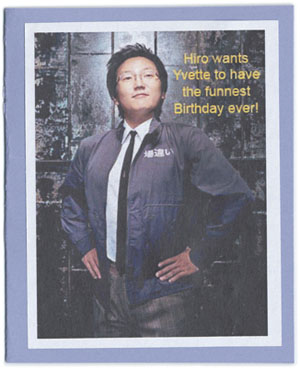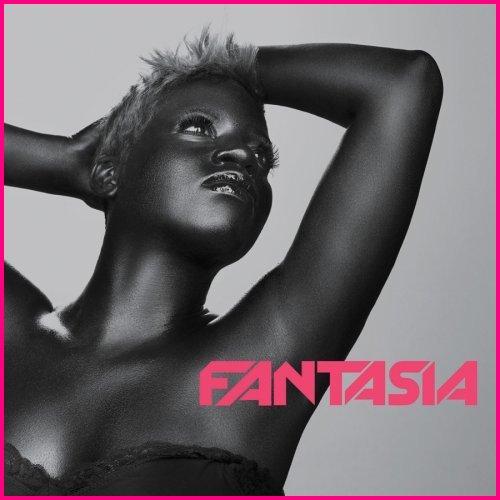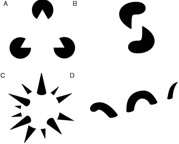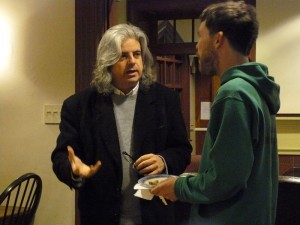The subconscious syntax of Michæl Chabon’s hair
Michæl Chabon can’t keep it up — that wisp of hair that seems to always hang on his forehead all the time. At first glance, one sees a random tuft from a man perhaps too deep in thought to use a comb more than once a day; but I started noticing that these locks made grammatical marks, as if to suggest “don’t just read my book, read my face.” I once went to a Chabon reading at the public library. He called the organizers from his cell phone minutes before the event claiming public transit was crazy. “More fountain water for me,” I thought.
The following is a list of the subconscious syntax of Michæl Chabon’s hair, including excerpts which illustrate said grammatical functions.
1. The Apostrophe

Chabon is not in the business of the avante garde, so there will be no mind blowing today, just a pretty legit use of apostrophes. From The Amazing Adventures of Kavelier & Clay, which won the Pulitzer in 2001:
As soon as the German army occupied Prague, talk began, in certain quarters, of sending the city’s famous Golem, Rabbi Loew’s miraculous automaton, into the safety of exile.
That was a pretty nice use of two apostrophes, both as possessive ones. I tried to find apostrophes used as contractions, but couldn’t, so I’ll put some of my own. I have a feeling maybe good writers aren’t supposed to use contractions. Ain’t that shit.
Brief q+a with Laird Hunt (updated with comments re: Ulysses thread)
 I’ve read some good books put out by good presses this year (Graywolf, Dalkey and the NYRB come to mind, but I’m not discounting Eugene Lim and Ellipsis’s [Ellipses?] forthcoming books from that list. Can’t wait to check those out). But I don’t think anyone has hit it out of the park yet in 2009 like Coffee House. Evenson’s book completely eviscerated me and others just like me and probably others not at all like me (it has that kind of broad appeal). It’s easily the best story collection I’ve read in quite awhile. The other beauty, though, is Ray of the Star by Laird Hunt. The story of a guy named Harry, shattered by an accident that took the lives of his family, as he attempts to reconnect to life, love and sanity kicks serious ass. Remarkably, Hunt just keeps getting better, and it excites me to think that we haven’t even seen his best yet. I emailed with the author a little bit, and he fielded my asinine questions, which I just sent to him en masse, with wit and aplomb.
I’ve read some good books put out by good presses this year (Graywolf, Dalkey and the NYRB come to mind, but I’m not discounting Eugene Lim and Ellipsis’s [Ellipses?] forthcoming books from that list. Can’t wait to check those out). But I don’t think anyone has hit it out of the park yet in 2009 like Coffee House. Evenson’s book completely eviscerated me and others just like me and probably others not at all like me (it has that kind of broad appeal). It’s easily the best story collection I’ve read in quite awhile. The other beauty, though, is Ray of the Star by Laird Hunt. The story of a guy named Harry, shattered by an accident that took the lives of his family, as he attempts to reconnect to life, love and sanity kicks serious ass. Remarkably, Hunt just keeps getting better, and it excites me to think that we haven’t even seen his best yet. I emailed with the author a little bit, and he fielded my asinine questions, which I just sent to him en masse, with wit and aplomb.
I was reading your playlist suggestions on the Times website, and I was pretty blown away to read that you wrote Ray of the Star in six weeks. Do you normally write that fast? You strike me as more of a deliberate writer, agonizing over word placement and rhythm and other aesthetic concerns. Six weeks!?
I’ve never written anything that fast, although years ago I wrote the first draft of my first book, The Paris Stories, with considerable speed (and a lot of cigarettes). Of course there was a good deal of reworking, after I had done the first draft of Ray, but it was nothing like my experience with the first three novels, each of which unfurled themselves slowly over a period of years. Both Indiana, Indiana and The Exquisite lived happy plot-free existences for at least 2 or 3 years before I saw the stories in them and could start to think of ways to shape those stories into something interesting. Ray’s story and the plot built in and around it were there from the beginning. As were those bloody sentences.
Chris Tonelli on Ellen Kennedy, at Open Letters Monthly
 After the epic fail that was Matt Soucy’s lazy, mean-spirited review in Coldfront–a rare blunder for one of the best poetry sites out there–it brings me enormous pleasure to direct your attention to Chris Tonelli’s excellent microreview of sometimes my heart pushes my ribs, newly online at Open Letters Monthly.
After the epic fail that was Matt Soucy’s lazy, mean-spirited review in Coldfront–a rare blunder for one of the best poetry sites out there–it brings me enormous pleasure to direct your attention to Chris Tonelli’s excellent microreview of sometimes my heart pushes my ribs, newly online at Open Letters Monthly.
Happy Birthday, Julia Cohen!!!!

Dear Internet, it’s poet and blogger extraordinaire Julia Cohen‘s birthday today. How old is she turning? Not the issue. What’s important is that this is an opportunity to remember why we love Julia, and to avail ourselves of her work. We can read her poems at Web Conjunctions, Sawbuck, and Pilot. (We can find more links via her blog.) If we want to get her a present, we could buy one of her chapbooks- The History of a Lake Never Drowns, or, if we’re big spenders, When We Broke the Microscope (a collaboration with Mathias Svalina). We could also leave comments on her blog about how much we’re looking forward to the five–five–chapbooks she’s got forthcoming, including For the H in Ghost, which I single out here because I read it (or some version of it) in manuscript, and so am excited for all of you to discover it. HAPPY BIRTHDAY JULES.
GIANT Review: Stephen Elliott’s The Adderall Diaries
 HTMLGIANT and the RUMPUS love each other; everyone knows that. We also work together often; everyone knows that too. It’s like this office romance everyone is really okay with and maybe even roots for because it’s between two basically likeable freelancers who are each a dozen freelancers, none of whom ever actually go to the office, and if they did it wouldn’t be the same one anyway. Which is another way of saying it is AWESOME. But given that fact, it seems ludicrous to pretend to anything like objectivity or critical distance about Rumpus-editor/steam-engine Stephen Elliott‘s new book, The Adderall Diaries. Therefore, I decided to drop all pretense and just write him a letter that says what I think of his book, which, by the way, is officially available today. (Click through to see his generous offer of free used galleys for would-be readers who make less than $25k/year.)
HTMLGIANT and the RUMPUS love each other; everyone knows that. We also work together often; everyone knows that too. It’s like this office romance everyone is really okay with and maybe even roots for because it’s between two basically likeable freelancers who are each a dozen freelancers, none of whom ever actually go to the office, and if they did it wouldn’t be the same one anyway. Which is another way of saying it is AWESOME. But given that fact, it seems ludicrous to pretend to anything like objectivity or critical distance about Rumpus-editor/steam-engine Stephen Elliott‘s new book, The Adderall Diaries. Therefore, I decided to drop all pretense and just write him a letter that says what I think of his book, which, by the way, is officially available today. (Click through to see his generous offer of free used galleys for would-be readers who make less than $25k/year.)
Dear Stephen,
September 1st, 2009 / 11:27 am
“Hope is the promise of a crucifixion.”

So wrote Benjamin De Casseres–a lost legend of the early/mid-20th–a man about whom I knew nothing until today, when I read the latest Tabletmag.com piece by the great Joshua Cohen (whose “Bridge & Tunnel (& Tunnel & Bridge)” will be out from The Cupboard Pamphlet later this year). Here’s a little taste of the article. Click-thru anywhere below for smorgasbord.
Guest post: Gabriel Blackwell on Ross Macdonald

“The surprise with which a detective novel concludes should set up tragic vibrations which run backward through the entire structure.”
That’s Kenneth Millar, better known as Ross Macdonald, who wrote eighteen Lew Archer novels over thirty years before Alzheimer’s put an end to his career. Incredibly, as the man got closer and closer to Alzheimer’s, his structures, those surprises, only became more and more complex. The best of his novels, from The Galton Case right on through to The Blue Hammer must have required extraordinary mental effort just to keep the characters straight, which, of course, they never were to begin with.
Macdonald’s characters rarely have fixed identities. Those surprises that he mentions in the quote are less Agatha Christie or Sherlock Holmes than “General Hospital”: a wife is really her husband’s daughter, a Frenchman is really a Panamanian, but also really a Frenchman, etc. Like I said, complex. Phantasmagoric even. Sometimes illegal. READ MORE >
August 27th, 2009 / 4:01 pm
New Friend! Also, Party!
Last night I was out with some people, and one of them was Erica Plouffe Lazure, singer in The Dog House Band (pictured above), which is the Bennington MFA-based country-rock outfit whose membership also includes David Gates and Sven Birkerts. Unsurprisingly, the woman in the all-writers-band is herself–wait for it–a writer. Here’s “Evisceration Line,” a sweet (read=”sad”) short story at Keyhole magazine. And here’s a short-short at SmokeLong Quarterly, “Green Monster,” accompanied by a Q&A with Erica. Also, “Cadence,” in the thoroughly un-link-to-able (because it exists in the actual physical world) McSweeney’s #29. Finally, this is as good a time as any–better than some–to remind you that if you’re in New York, you should come see The Dog House Band play the Opium/Gigantic/Bomb Party at Bowery Electric this Wednesday, August 26th. Special guests will include John Wesley Harding, one of the Pierce Sisters, a short play directed by Ben Greenman, and other stuff that I can’t remember off the top of my head. But here’s the thing you click to get yourself a ticket. They’re ten bucks in advance, fifteen the day of, and “all pre-sales get free VIP access”–whatever the eff that means. Anyway, I bought mine, so I guess I’ll find out.
I forgot to mention this: Michael Martone’s 4 for a Quarter twitter feed is brilliant.
Michael Martone’s Reading List for “American Short Fiction of the 70’s and 80’s”

Recently in the comments section of this post, DD mentioned Michael Martone’s workshop reading list. Dear Leader responded by asking for the full list. DD didn’t have the list handy.
So I wrote to him to see if he would share it with us. First, he said his recent workshops don’t have a book list except, “Hyde’s The Gift and a baby name book called Beyond Jennifer and Jason. Also The Mac is Not a Typewriter and sometimes Mr. Wilson’s Cabinet of Wonder.”
But, he teaches a class called American Short Fiction of the 70’s and 80’s, and was happy to share the reading list. It—and more—appear after the jump: READ MORE >

